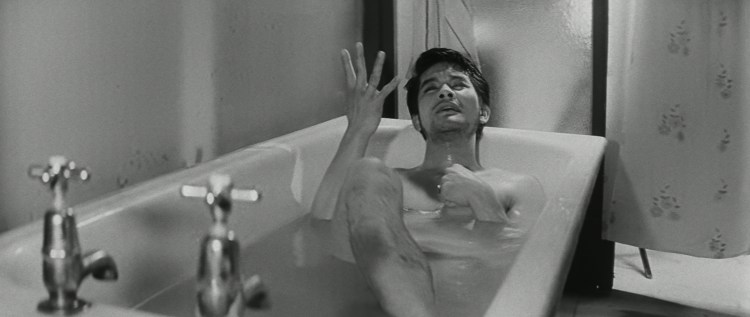
“Crime doesn’t pay” is the moral of many a film, but few of them care to state as much upfront. Not perhaps since The Public Enemy has a moral message been declared so baldly on screen as it is in the title card overlying the opening of Lin Tuan-Chiu’s Six Suspects (六個嫌疑犯) which tells us in no uncertain terms not only that you reap what you sow, but also that we law abiding citizens have nothing to fear because we are “well protected” by the police. In the end, Six Suspects was never released (apparently because Lin was unhappy with it rather than any censorship issues), but is perhaps a curious example of a pro-police drama masquerading as a noirish crime thriller with a surprisingly leftist message that dares to suggest the new middle class is inherently corrupt.
Our anti-hero is a roguish blackmailer, Tenn Kong-Hui (Wu Dongru), who has a habit of following people around and taking photos he can use as leverage against them later. His ex-girlfriend Tai-Giok (Zhang Qingqing) has moved on and attempted to go straight with a job as the secretary to the CEO of a steel firm, but is also having a “serious” affair with the man who hopes to become his son-in-law, Lap. Meanwhile, the chairman’s brother, Khe-bing, has troubles of his own. He’s already being blackmailed by a bar hostess who may have lied about conceiving a child with him before he was married to his elegant wife, who is also a target for Kong-hui after he spots her meeting with a beatnik artist. The real problem, however is that through all his various investigations, Kong-hui has stumbled on a deeply entrenched system of corruption running between the steel company and local contractors.
It will come as no surprise that Kong-hui is eventually bumped off. Someone knocked him on the back of the head and then turned the gas on to make it look like he killed himself. His roommate, actually in love with the chairman’s daughter even though she’s still planning on marrying Lap to please her dad, freely admits Kong-hui was “scum” but thinks it’s unlikely he did himself in. The police eventually agree, but have the luxury of too many suspects. Who did it? Two yakuza-esque petty gangsters going by the names “Snake” and “Turtle” because of their tattoos, Lap, his old flame Tai-Giok, the roommate who apparently argued with him on the night in question and then passed out drunk in a park, Khe-bing and/or his wife, or someone else entirely?
In some senses, it doesn’t really matter. The society here is so inherently corrupt that no one is really “innocent” except perhaps the pure-hearted roommate who remains shocked and disgusted by the results of his police detective friend’s investigations and innocently in love with the chairman’s unobtainable daughter. The ambition that comes from the widening wealth gap is instantly on display as the film opens with Lap in bed with Tai-Giok but brushing off her suggestions that they marry by reminding her she’ll be the most comfortable of mistresses when he marries the chairman’s daughter. In another kind of film, they would be our central couple – their pure love corrupted by post-war greed, but we later realise neither of them is very much in love at all and their “relationship” must be based on some other factor. Lap isn’t betraying Tai-Giok to marry the boss’ daughter, though there may be other casualties of his all too willing complicity in an increasingly amoral economy which sees him gleefully accepting kickbacks and wining and dining clients in restaurants where you can hire scantily clad dancers to entertain you while you eat.
Despite his rather obvious villainy, Kong-hui wasn’t really all that bad, just a product of the world in which he lived. In fact, the film almost sides with him in his one man crusade against “immorality”. In any case, the real villain as we later see is equal parts prudery and an elitist entitlement that enables this level of corruption to prosper. Our “heroes” are of course the police, turning their collars to the cold as they work tirelessly to fight “crime” but also, it has to be said, acting on behalf of an oppressive regime which may be the biggest villain of them all.
Six Suspects screened as part of touring retrospective Taiwan’s Lost Commercial Cinema. It will also be available to stream in the UK as part of the Taiwan Film Festival Edinburgh from 18th to 27th September.
Restoration trailer (English / Traditional Chinese subtitles)
